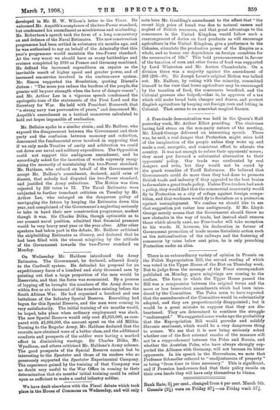Mr. Bellairs spoke in a similar strain ; and Mr.
Balfour, who exposed the disagreement between the Government and their party and the confusion between economy and reduction, denounced the fundamental error involved in supposing that if we only made Treaties of amity and arbitration we could cut down our naval and military expenditure. The Opposition could not support this ambiguous amendment, and he accordingly asked for the insertion of words expressly recog- nising the necessity of maintaining the two-Power standard. Mr. Haldane, who refused on behalf of the Government to accept Mr. Balfour's amendment, declared, amid cries of dissent, that nobody had disputed the two-Power standard, and justified the Army reductions. The Motion was then rejected by 320 votes to 73. The Naval Estimates were subjected to further trenchant criticism on Tuesday by Mr. Arthur Lee, who enlarged on the dangerous policy of mortgaging the future by keeping the Estimates down this year, and complained of the Government's neglecting seriously to take in hand their new construction programme, modest though it was. Sir Charles Dilke, though optimistic as to our present naval position, admitted that financial pressure would be very heavy next year or the year after. After other speakers had taken part in the debate, Mr. Balfour criticised the shipbuilding Estimates as illusory, and declared that be had been filled with the utmost misgiving by the attitude of the Government towards the two-Power standard on Monday.














































 Previous page
Previous page